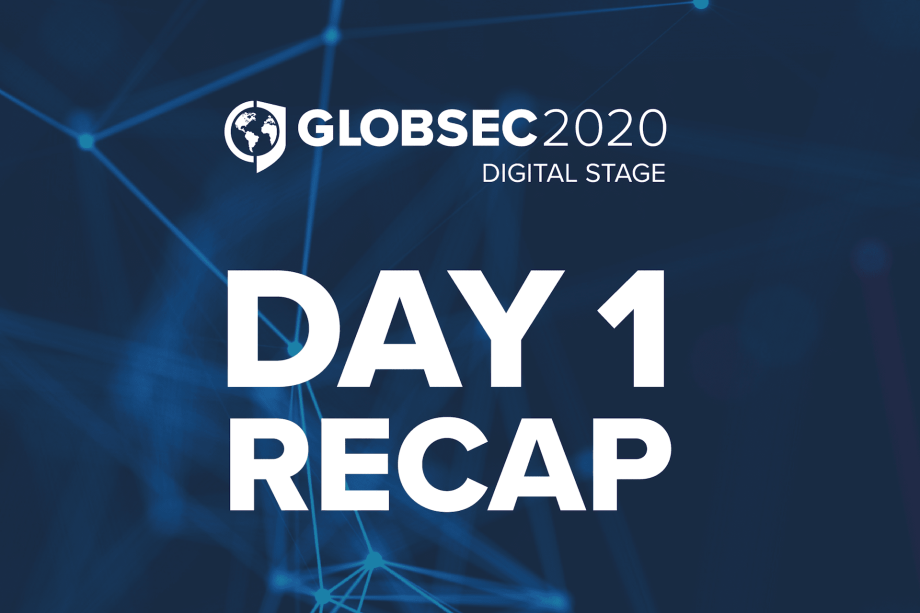GLOBSEC 2020 Digital Stage Day 1 Recap

Read the recaps for Day 2 and Day 3 of the GLOBSEC 2020 Digital Stage.
The first day of the GLOBSEC 2020 Digital Stage offered a host of interesting topics and inspiring speaker lineups. It came as no surprise to see the centre of the session around the turmoil of the past few months caused by the COVID-19 pandemic. The crisis has exposed the fragility of the world we live in, whilst highlighting the need to devise new functioning models for society, economy and politics.
The impact of the COVID-19 pandemic on the world was in the spotlight of the opening session featuring Kersti Kaljulaid, President of the Republic of Estonia and `Robert Kaplan, Managing at Director Euroasia Group. Both participants agreed that the COVID-19 outbreak stoked global mistrust and insecurity and disrupted the known international order and ‘modus operandi’. With the pandemic, we’ve entered a new chapter of Globalisation 2.0. The world dominated by a more fractured international order weakened global superpowers and dysfunctional relations. COVID-19 is, without doubt, going to be part of our new world, in which the old categories and realities of Globalisation 1.0 don’t count anymore. We need to devise strong and robust crisis management in order to be able to deal with disruptive and unexpected events that might threaten to harm our future existence. We should not compete with ourselves while talking up our differences and talking down our strengths. Stronger alliances, as global challenges cannot be solved at a national level, should be our number one priority, with the digital transformation of our economies and societies, improvement of micro-management and rebuilding of trust in experts to follow suit.
The changing nature of the transatlantic community smeared by disagreements among its members, the growing EU-US divide, and heightened geopolitical concerns over a revanchist Russia and a more assertive China was addressed by H.E. Ivan Korčok, Minister of Foreign and European Affairs of the Slovak Republic and Amb. Philip T. Reeker, Acting Secretary of State for European and Euroasian Affairs of the United States of America. While reviewing the current pandemic impact on the geopolitical stage and discussing the state of the alliance, both panellists came to the conclusion that common values such as resilience, the rule of law and security, deeply embedded in transatlantic relations, are now more important than ever. Amb. Philip T. Reeker emphasised that respect and mutual reciprocity are the bottom lines of functioning transatlantic relations, allowing for an open and structured EU-US dialogue in order to achieve more tangible results in an efficient and comprehensive manner.
The coronavirus pandemic aggravated the need for a major overhaul of Central and Eastern European economies. Dragoș Pîslaru, Member of the European Parliament, Alexander Resch, CEO of VUB Bank, Lászlo Andor, Secretary-General, Foundation for European Progressive Studies and Soňa Muzikárová, Chief Economist at GLOBSEC agreed that the plan to reinvigorate the outdated CEE growth narrative needs to include enhanced cooperation between the private and public sectors, whiles governments should take a more active role in making use of new innovative technologies and in implementing innovation strategies. The more effective governments are in their efforts, the quicker the recovery will be. The participants concluded that the economic crisis induced by the COVID-19 pandemic is also an opportunity for the CEE region to dramatically restructure its economies in order to make them stronger and more resilient.
The commotion of the past months forced us to ‘retreat’ into the world of online space. This new reality has unearthed how big of a problem the spread of disinformation and conspiracies has become. Clare Melford, Rand Waltzman and Vladimir Bilčík emphasized that the digital world should be regulated as much as the offline world is and this process must be led by policymakers. All panellists claim that platforms, where the spread of disinformation thrives, must be held accountable and responsible for the content they circulate. The EU’s upcoming Digital Services Act should be the answer to this problem, however as Rand Waltzman pointed out, no policy will be effective until the countries first agree on a clear definition of disinformation and invest into the development of technical capacities for automated detection of disinformation and verification of the effectiveness of both disinformation and counter-messaging.
Strong public resistance to accept the result of the recent presidential election in Belarus has captivated the world with its unprecedented and inspiring social and political mobilization. Day 1 of the GLOBSEC 2020 Digital Stage concluded with a discussion on the current situation in Belarus. The participants, Amb. Michael Siebert, Carl Bildt and Amb. Daniel Fried concurred that the unanimity of the EU in its non-recognition of the outcomes of the elections and a quick indication of the preparation of sanctions is an important signal for both the government and the people of Belarus. A coordinated response between the EU, US, Canada and other democratic countries would be the most effective message and a path forward.
Read the recaps for Day 2 and Day 3 of the GLOBSEC 2020 Digital Stage.